Compassion began its ministry in Ghana in 2005 with the Child Sponsorship Program. Since then we have registered 25,000 children.
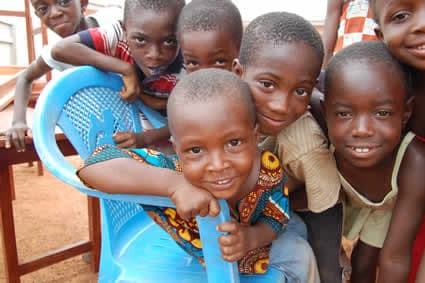
Some children who were not attending school due to financial constraints at the time of registration have all been enrolled and are doing well in school. In addition, four of our registered children have participated in and won awards at the National Sports Championship.
Country Director of Ghana
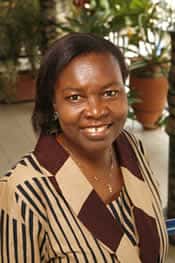 Jemima Amanor joined us as Country Director of Ghana in 2005. Before coming to our ministry, she worked at World Vision Ghana where she served in various capacities.
Jemima Amanor joined us as Country Director of Ghana in 2005. Before coming to our ministry, she worked at World Vision Ghana where she served in various capacities.
Prior to her time at World Vision, Jemima worked as a district public health nurse and a nurse educator in a nursing institution of Ghana’s Ministry of Health.
Jemima holds a bachelor’s degree in education, a diploma in nursing education, a state registered nurse certificate with specialization in public health, and a Master of Arts degree.
In 2008, Jemima was ordained as a minister of the Methodist Church Ghana. She assists in ministering to a local church on the weekends.
Implementing Church Partners
Implementing Church Partners are local churches in Ghana with whom we work to deliver child development programs and ministry in the field.
- Spiritual Climate
The spiritual climate in Ghana is healthy and there is no persecution, but the growth of Christianity is quite slow. - Unique Challenges
One challenge our ministry in Ghana faces is the frequent change of pastors due to transfers. This makes it difficult for them to understand the mission and vision of Compassion.Also, some denominations have greater resource and infrastructure constraints, which can cause the selection of church partners to skew towards one denomination over another.
- Contributions
Implementing Church Partners provide the office space and furniture as well as labor to support some of the Complementary Intervention activities.The Implementing Church Partner committee spends time monitoring the program and volunteers commit time to the child development center.
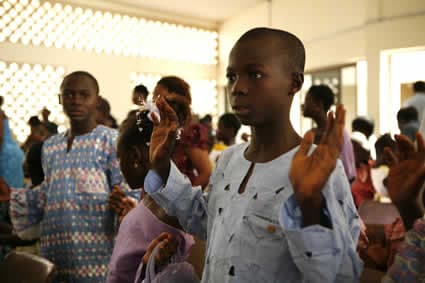
- Church-to-Church
There is a church in the United Kingdom that is in partnership with two Implementing Church Partners in Ghana. A playground was built for one Implementing Church Partner and a computer resource center for the other.Members of this supporting church are sponsoring all of the children in these two child development centers. Also, community members have become more sociable and involved due to their interaction with members from the supporting church.
- Partner Development Activities
Our ministry in Ghana develops our partners through training, vision sharing, cluster meetings, a holistic child development course for church workers, and pastor’s conferences. The training provided includes project management, technical skills, on-the-job training, training for Implementing Church Partner committees and pastors on their roles and responsibilities, and child protection.
Child Development Through Sponsorship
Your sponsorship of a child in Ghana provides a variety of benefits.
Children in Ghana are busy with school during the weekdays, so they go to the child development center on Saturdays. However, some Implementing Church Partners do meet for two hours on weekdays during holidays in addition to the Saturday meetings.
- Weekly meetings
- 3 to 5 year olds: 8 hours on Saturdays
- 6 to 8 year olds: 8 hours on Saturdays
- 9 to 11 year olds: 8 hours on Saturdays
- 12 to 14 year olds: 8 hours on Saturdays
- 15 to 22 year olds: There are no children in this age group.
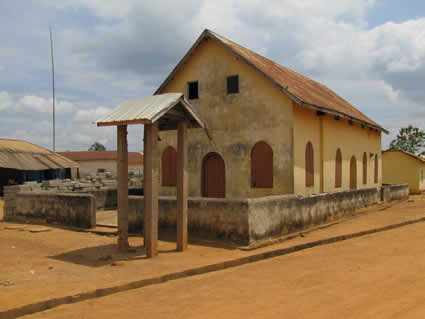
- Nutritional Support
- Vaccinations
- Extracurricular Activities or Community Service
Each child receives breakfast, lunch and dessert at the child development center.
Breakfast consists of maize porridge, milk, sugar, bread and ground nut paste. Lunch consists of rice with sauce and either chicken, fish or meat. Dessert is an orange, banana or pineapple.
We provide this food because children do not always eat nutritionally balanced meals at home, and most of them come to the child development center hungry. Parents are educated to provide nutritious food for their children, and highly malnourished children are given a package of nutritious foods including eggs, milk, beans, rice and oil once a month.
When the government mandates that a specific vaccination be given, then children will go to a nearby health clinic to receive that vaccination free of charge. Sometimes, the government will even send health workers door-to-door to ensure the particular vaccination is given to all children under the age of 5.
However, if a child needs a vaccination that has not been mandated by the government, the family must pay for that vaccination.
The children participate in choreography, drumming and dancing, and football every Saturday. Sports, arts, camps and community cleanup is offered yearly.
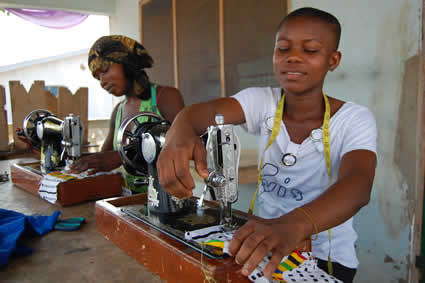
- Vocational Activities
- Parent Involvement
Specific vocational activities offered to adolescents are common in Ghana and trainers are readily available. Adolescents are typically involved in formal secondary schooling and vocational training. Many are learning bead making and batik making at the child development centers.
In addition, the Implementing Church Partners have implemented a “peer education” program. We feel that when the children reach the teen years, it is more effective to allow them to discuss issues such as sex and body changes with other teens since many of them do not feel comfortable discussing these issues with parents or teachers.
However, when peers discuss these issues among themselves, often the information shared is incorrect and even detrimental. To mitigate this, the Implementing Church Partners equip certain children called “peer educators” with the correct information to share with their peers in their development centers, communities, churches and schools.
Parents and caregivers meet at least once a month at the child development centers for education on parenting, health and nutrition and business management training.
Complementary Interventions
Our core child sponsorship program, while comprehensive, does not address all obstacles to a child’s healthy development. The Complementary Interventions program was created to work with our holistic child development model to provide additional services, such as our AIDS Initiative, funds for Bibles for All Children, disaster relief and water projects.
Typical Complementary Interventions in Ghana include:
- Water facilities
- Sanitary toilet facilities
- Insecticide-treated nets for children and their caregivers
- Heart and other major surgeries
- Resource centers such as computer labs and libraries
- Curriculum printing
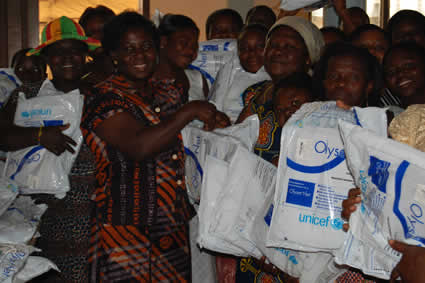
Highly Vulnerable Children
Malnourished children whose caregivers are not working are our greatest need. Children are given nutritional supplements, and parents or caregivers are given start-up support for income-generating businesses and business management training.
Parents and caregivers are encouraged to work hard and save money to help them get out of poverty and most of them are doing well. We also provide counseling for the registered children and their caregivers.
Eventually, we would like to expand into the eastern, Volta and Ashanti regions of the country. These regions are next in Ghana’s national the poverty rating.


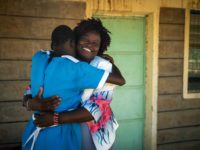
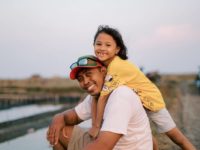
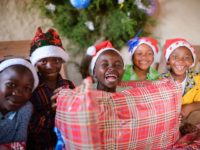


3 Comments |Add a comment
Love it! Today a friend made a comment about how when God does a thing He doesn’t just do it halfway, isn’t this the truth here! Look at what the Lord poured into the County Director, Jemima, preparing her for years for this! Her education, knowledge and experience and most of all her faith are being used so much for ‘such a time as this!’ Thank You Lord for this woman of faith.
The people who work at the child development centers are volunteers? And they care for ages 3-14 for 8 hours on Saturday? Um…….crowns in heaven coming for them one day! Thank You Lord for these!
I am so thankful that there is no persecution of believers here, will pray that the pastors will stay and be strong leaders for their people. How can we encourage these pastors?
This article raised a million questions for me. Why do the pastors get transferred? Are the volunteers in the centers different each month? Do the parents really participate in nutrition and parenting classes or is it hard to encourage them to come? Is there any possibility that the children can grow vegetables at the centers….especially greens, like spinach-what would it take to be able to do this?
Do any of the centers have the ability also to raise chickens or goats on their property, to teach animal husbandry and small business and help the families have more skills/food/income?
Praying for all of these things and the needs mentioned in the article-thank you so much for giving us the pictures and more information! Is there any way that each picture could be labeled, as to which center each one is from? If not that’s ok, just glad to get to see this, I appreciate you! Oh…..I scanned each face carefully, wondering ‘is this my Stephen?’ ‘is that one my Stephen?’ Silly! He’s not ‘my Stephen’, he belongs to his Mother and Father who love him very much and first of all to his heavenly Father! But I am glad that I get to be a part of his life, for whatever time that God allows. What a privilege it is!
These posts are wonderful! I love knowing more about the region where our Precious lives!
This is a good DVD for anyone who sponsors in Ghana: http://www.amazon.com/Families-Ghana-World-Mark-Marquisee/dp/B000AOEPPW We found it in our library system!
And this blog post shares a few children’s books I have found based on Ghanian people: http://www.bloggingfromtheboonies.com/2010/06/keeping-track-of-our-compassion.html
Thank you SO much. I sponsor a child in Ghana and it’s so good to have these insights!! I love seeing country profiles and project and child success stories. Please keep them coming!